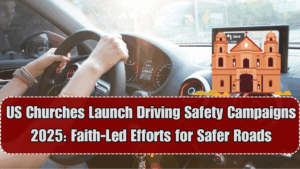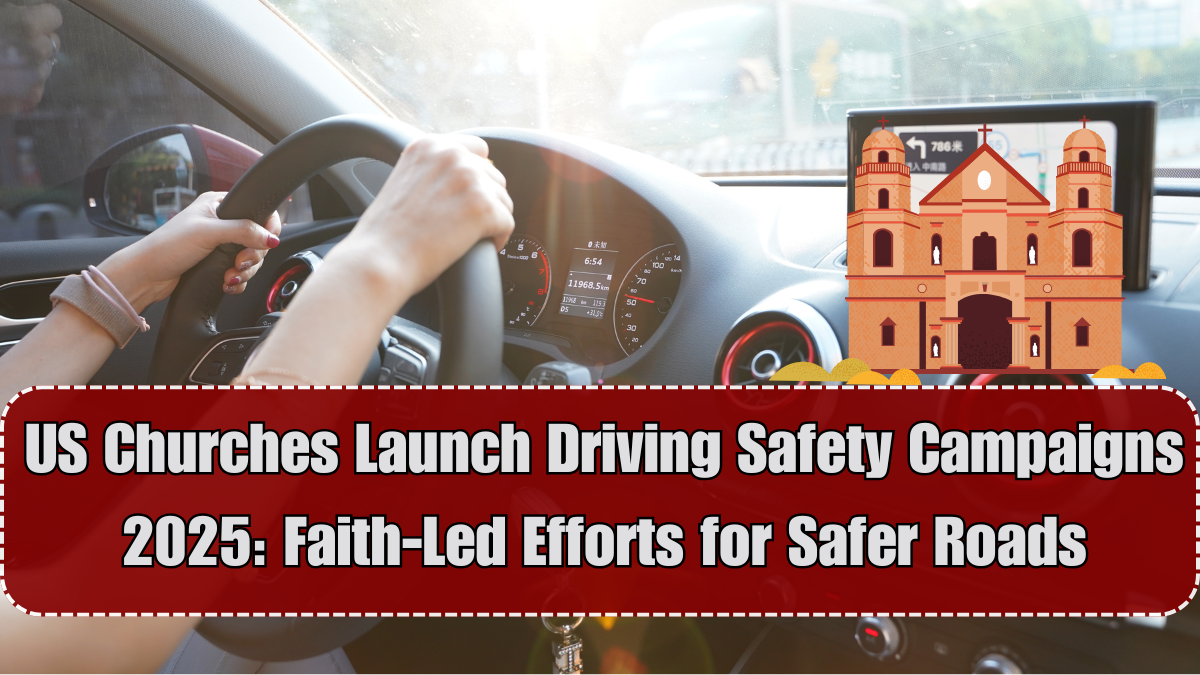The Faith-Based Driving Safety Campaign 2025 is emerging as one of the most community-rooted and impactful initiatives this year. Across the United States, churches and religious groups have taken a bold step to champion road safety awareness—especially targeting young drivers, families, and elderly members in faith communities.
With rising concerns around speeding, distracted driving, and low helmet/seatbelt compliance, this initiative brings spiritual responsibility into the conversation around road use. Church leaders are now blending sermons, youth programs, and workshops to spread the message of driving safely as a moral obligation.

What the Faith-Based Campaign Focuses On in 2025
The faith-based driving safety campaign 2025 focuses on combining traditional road safety measures with faith-based education. The core goal is to create long-term behavioral change through moral accountability and communal reinforcement.
Key focus areas of the campaign:
-
Promoting consistent seatbelt use and helmet safety
-
Raising awareness on drunk and distracted driving
-
Educating youth on speed limits and signaling etiquette
-
Encouraging elderly drivers to stay medically fit for driving
-
Building prayer-based healing and remembrance for accident victims
By embedding safety messages within church services and youth ministry events, the initiative is becoming a powerful blend of spiritual and practical guidance.
Table: Faith-Based Safety Activities in US Churches (2025)
| Program Type | Description | Audience |
|---|---|---|
| Youth Driving Workshops | Peer-led and clergy-assisted driving rule sessions | Teens & young adults |
| Sermon Series | Weekly sermons incorporating driving responsibility | All age groups |
| Road Safety Sundays | Special events with DMV speakers and testimonies | Congregation-wide |
| Helmet & Seatbelt Drives | On-site demonstrations, free helmet distributions | Riders & cyclists |
| Prayer for Victims | Monthly sessions for accident survivors and families | Community at large |
These programs are being conducted in collaboration with local law enforcement and state transportation departments, further legitimizing the church-led road safety campaign.
Why the Church’s Role Matters in Road Safety
In 2025, spiritual communities continue to be trusted institutions—especially in rural, low-income, and minority populations. The church campaign road safety 2025 isn’t just a top-down educational drive. It fosters community bonding, care for others’ lives, and emphasizes faith in action.
By connecting safe driving habits to values like honoring life, community protection, and discipline, churches are uniquely positioned to address deep-rooted habits and encourage reform from the heart—not just fear of fines.
Moreover, many faith groups now provide transportation services, such as Sunday buses or vans for elderly attendees. Making those rides safe also means adhering to driving norms and ensuring vehicles are fit and properly insured.
Results So Far and the Road Ahead
The initial results of the faith-based driving safety campaign 2025 are already visible:
-
Youth speeding incidents dropped by 14% in select pilot cities
-
Helmet usage rose by 22% during community ride events
-
Over 5,000 helmets were distributed by church volunteers
-
Church groups hosted 200+ sessions on road safety between Jan–July 2025
States like Texas, Georgia, and Michigan have praised the effort, and now other institutions like mosques and synagogues are preparing similar drives. The campaign is expected to expand further in the fall, especially before holiday road travel begins.
FAQs
What is the Faith-Based Driving Safety Campaign 2025?
It’s a church-led national initiative in the US to promote road safety through sermons, youth programs, and public education.
Who started the campaign?
The campaign is supported by multiple church coalitions, in collaboration with local DMV authorities and state road safety councils.
What activities are included in the campaign?
Youth workshops, safety equipment distribution, sermons, and road safety events are key elements of the initiative.
Are only churches involved in this campaign?
While churches initiated it, other religious communities are beginning to adopt similar models.
Is this campaign happening in all states?
As of August 2025, it’s active in over 30 states with growing participation in urban and rural communities.
How can I volunteer for these programs?
Contact your local church or religious institution to check if they are participating. Many accept volunteers for awareness events.
Click here to know more.
